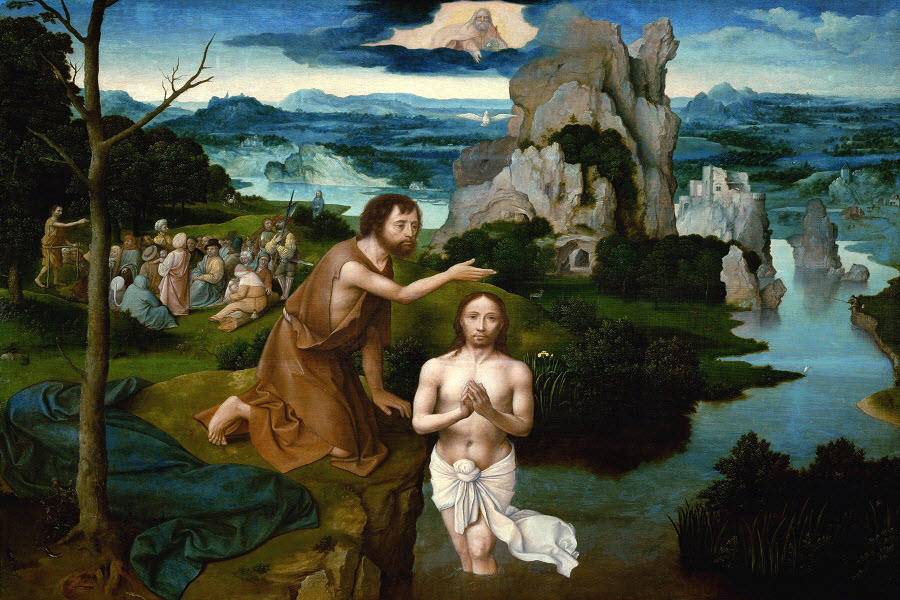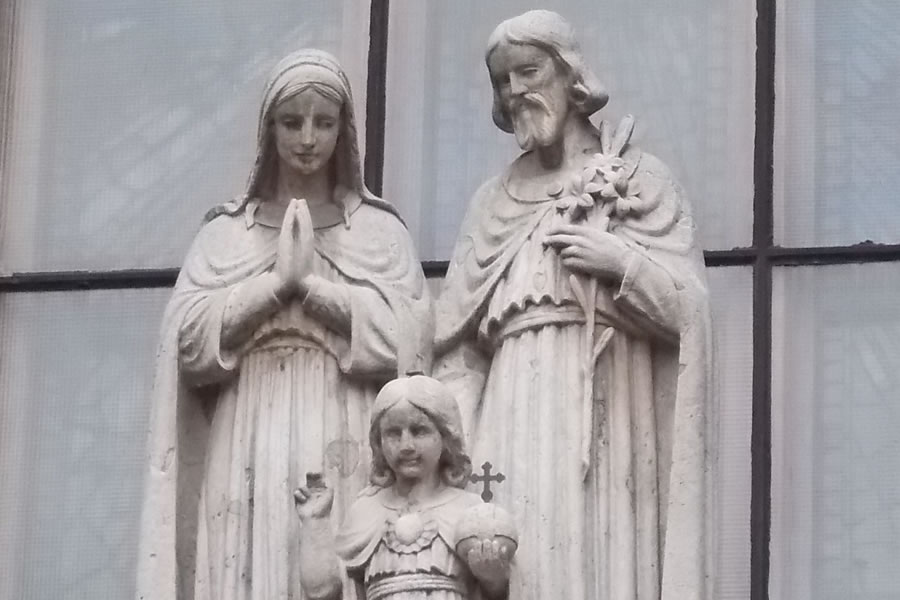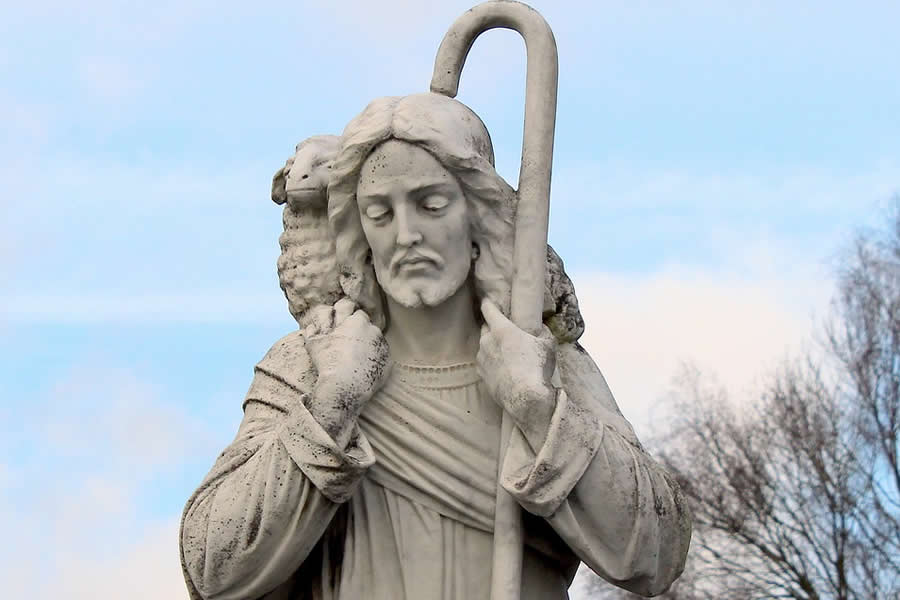St. Francis of Assisi Weekly Reflections

Lent begins this Wednesday, February 26 – Ash Wednesday.
02-23-2020Weekly ReflectionFr. Mathew Vettath Joseph, SDVDear brothers and sisters,
This week, on the day we call Ash Wednesday, we will begin our Lenten journey. Lent is truly a season of grace, a time of sacrifice, penance and prayer as we prepare to celebrate the greatest event of our faith; the resurrection of our Lord and savior, Jesus Christ. This is a real opportunity to reexamine our relationship with God.
I am always encouraged by the close relationship of Lent with the spring season, which is a time of new beginnings. The flowers and plants begin to blossom again. Individuals or families engage in spring cleaning. Attics, garages and closets are emptied of old stuff or other items that have not been used in many years. We can also see Lent in this way. Every year, the Church gives us these seven weeks so that we can engage in our own spiritual spring cleaning. As we go through life, we acquire many things that weigh on our souls and slow us down on our journey towards God. This Lenten season will help us to embrace our baptismal commitment in a renewed way and to turn us away from sin and back to God.
In the Gospel reading for Ash Wednesday, our dear Lord Jesus, speaks to us of the three traditional pillars of Lent; Prayer, Fasting and Almsgiving.
In prayer, we spend more time listening and not necessarily talking all the time. We practice the art of being quiet as we wait for the answer to the question: "What is God trying to tell me?"
We fast not only fast from food or drink, but also from the routines we all fall into that prevent us from living consciously. We fast from the things that dull our awareness of God's presence in our lives at every moment, in every relationship, in every human encounter.
Almsgiving is more than the few dollars that we might offer to someone in need, but rather spending time looking for, finding, and acting in a concrete way to reach out to the poor and the marginalized.
This year, therefore, we encourage every family to participate in as many Lenten activities as you can. Fr. Cyril and I look forward to praying with you at the Stations of the Cross, Lenten mission days, Penance Service, day of reflection, Eucharistic Adoration, etc. This season urgently calls us to conversion. Christians are asked to return to God "with your whole heart, with fasting, and weeping, and mourning; rend your hearts, not your garments, and return to the LORD, your God. For gracious and merciful is he, slow to anger, rich in kindness, and relenting in punishment" (Joel 2:12-13).
May we refuse to settle for a mediocre Christian life. May we grow in friendship with our Lord Jesus who is our faithful friend who never abandons us. May the beginning of this Lenten season allow you and your family to grow closer to God.
May God Bless you all!
Fr. Mathew Vettath Joseph, SDV
Queridos hermanos y hermanas,
Esta semana, el día que llamamos Miércoles de Ceniza, comenzaremos nuestro viaje de Cuaresma. La Cuaresma es verdaderamente un tiempo de gracia, un tiempo de sacrificio, penitencia y oración mientras nos preparamos para celebrar el mayor evento de nuestra fe; la resurrección de nuestro Señor y Salvador Jesucristo. Esta es una oportunidad real para reexaminar nuestra relación con Dios.
Siempre me alienta la estrecha relación de la Cuaresma con la temporada de primavera, que es una época de nuevos comienzos. Las flores y las plantas comienzan a florecer nuevamente. Individuos o familias se dedican a la limpieza de primavera. Los áticos, garajes y armarios se vacían de cosas viejas u otros elementos que no se han utilizado en muchos años. También podemos ver la Cuaresma de esta manera. Cada año, la Iglesia nos da estas siete semanas para que podamos participar en nuestra propia limpieza espiritual de primavera. A medida que avanzamos en la vida, adquirimos muchas cosas que pesan sobre nuestras almas y nos retrasan en nuestro viaje hacia Dios. Esta temporada de Cuaresma nos ayudará a aceptar nuestro compromiso bautismal de una manera renovada y a alejarnos del pecado y volver a Dios.
En la lectura del Evangelio para el Miércoles de Ceniza, nuestro querido Señor Jesús, nos habla de los tres pilares tradicionales de la Cuaresma; Oración, Ayuno y Limosna.
En la oración, pasamos más tiempo escuchando y no necesariamente hablando todo el tiempo. Practicamos el arte de estar callados mientras esperamos la respuesta a la pregunta: "¿Qué está tratando de decirme Dios?"
Ayunamos no solo de la comida o la bebida, sino también de las rutinas en las que todos caemos y que nos impiden vivir conscientemente. Ayunamos de las cosas que opacan nuestra conciencia de la presencia de Dios en nuestras vidas en cada momento, en cada relación, en cada encuentro humano.
Dar limosna es más que los pocos dólares que podríamos ofrecer a alguien que lo necesita, sino más bien dedicar tiempo a buscar, encontrar y actuar de manera concreta para llegar a los pobres y marginados.
Este año, por lo tanto, alentamos a todas las familias a participar en tantas actividades cuaresmales como puedan. El P. Cyril y yo los acompañaremos en oración durante los Vía Crucis, la Misión Cuaresmal, el Servicio de Penitencial, el día de reflexión, la Adoración Eucarística y más. Esta temporada nos llama urgentemente a la conversión. Se les pide a los cristianos que regresen a Dios "vuélvanse a mí de todo corazón, con ayuno, llantos y lamentos; rásguense el corazón y no las vestiduras. Vuélvanse al Señor su Dios, porque él es bondadoso y compasivo, lento para la ira y lleno de amor, cambia de parecer y no castiga." (Joel 2:12-13).
Neguémonos a conformarnos con una vida cristiana mediocre. Crezcamos en amistad con nuestro Señor Jesús, que es nuestro amigo fiel que nunca nos abandona. Que el comienzo de esta temporada de Cuaresma te permita a ti y a tu familia estar más cerca de Dios.
¡Que dios los bendiga a todos!
P. Mathew Vettath Joseph, SDV

Trust in God
02-16-2020Weekly ReflectionWe Celebrate Worship Resource, Vol. 45, No. 1In the passages we hear today and next Sunday, Jesus challenges his disciples by extending or reinterpreting the Mosaic law. In doing so, he is contrasting his expectations with those of the scribes and Pharisees. What “you have heard” is insufficient. Listen to what “I say to you.” What is in your heart is as important as your actions. Yes, you should not kill, but do not even let anger build up in your heart to the extent that you provoke or abuse someone else. Yes, you should not commit adultery, but do not let your heart be overcome with lust that could overpower your moral behavior. True righteousness, Jesus teaches, is not determined by following the letter of the law, but its spirit. This wisdom revealed by Jesus was not available to Sirach. Yet he realized that we have free will and should choose to trust in God and God’s commandments. Fortunately, God’s wisdom has been revealed to us through the Holy Spirit, as Saint Paul assured the Corinthians. Let us choose to replace those poisons of the heart like anger and lust with patience and generosity, mildness and self-control. Let the Holy Spirit assist us in fulfilling the spirit of the law.
What is poisoning your heart? What can replace those poisons?
Confía en Dios
En los pasajes que escuchamos hoy y el próximo domingo, Jesús desafía a sus discípulos al extender o reinterpretar la ley mosaica. Al hacerlo, contrasta sus expectativas con las de los escribas y fariseos. Lo que “has escuchado” es insuficiente. Escucha lo que “yo te digo”. Lo que hay en tu corazón es tan importante como tus acciones. Sí, no debes matar, pero ni siquiera dejes que la ira se acumule en tu corazón en la medida en que provoques o abuses de otra persona. Sí, no debes cometer adulterio, pero no dejes que tu corazón sea vencido por la lujuria que podría dominar tu comportamiento moral. La verdadera justicia, enseña Jesús, no se determina siguiendo la letra de la ley, sino su espíritu. Esta sabiduría revelada por Jesús no estaba disponible para Sirácide. Sin embargo, se dio cuenta de que tenemos libre albedrío y deberíamos elegir confiar en Dios y en los mandamientos de Dios. Afortunadamente, la sabiduría de Dios nos ha sido revelada a través del Espíritu Santo, como San Pablo aseguró a los Corintios. Elijamos reemplazar esos venenos del corazón como la ira y la lujuria con paciencia y generosidad, suavidad y autocontrol. Deje que el Espíritu Santo nos ayude a cumplir el espíritu de la ley.
¿Qué está envenenando tu corazón? ¿Con qué puedes reemplazar esos venenos?

Shine Light in Darkness
02-09-2020Weekly ReflectionWe Celebrate Worship Resource, Vol. 45, No. 1We are challenged today to act. Right off the bat, Isaiah tells us that the Lord commands that we care for those in need. Isaiah had just spoken about fasting, but introduced the passage by saying, "This, rather, is the fasting I wish" (Isaiah 58:6). In a few weeks, Lent will begin and we will be asked to fast. Let Isaiah's words inform our actions. Let us fast because we have given food to those who are hungry. Let us live simply because we have given necessities to those who lack clothing or shelter. Let us offer our efforts and prayers to those who are oppressed. By doing this, we are bearing witness to our faith and shining a light for others to see. Jesus tells his disciples they are the light of the world, but they need to make their light visible so their deeds can be a model for all to see. This is our challenge now. To put it into Paul's words, our actions should demonstrate the power of the Holy Spirit working through us. When we care for those most in need, we shine God's light upon the world.
What can you do to shine light on the darkness in the world?
Ilumina la Oscuridad
Hoy tenemos el desafío de actuar. De buenas a primeras, Isaías nos dice que el Señor ordena que cuidemos a los necesitados. Isaías acababa de hablar sobre el ayuno, pero presentó el pasaje diciendo: "Esto, más bien, es el ayuno que yo escogí" (Isaías 58:6). En unas pocas semanas, comenzará la Cuaresma y se nos pedirá que ayunemos. Deja que las palabras de Isaías informen nuestras acciones. Ayunemos porque hemos dado comida a los que tienen hambre. Vivamos simplemente porque hemos dado necesidades a quienes carecen de ropa o refugio. Ofrezcamos nuestros esfuerzos y oraciones a los oprimidos. Al hacer esto, estamos dando testimonio de nuestra fe y brillando una luz para que otros la vean. Jesús les dice a sus discípulos que son la luz del mundo, pero que necesitan hacer que su luz sea visible para que sus obras puedan ser un modelo para que todos lo vean. Este es nuestro desafío ahora. Para ponerlo en las palabras de Pablo, nuestras acciones deben demostrar el poder del Espíritu Santo obrando a través de nosotros. Cuando nos preocupamos por los más necesitados, hacemos brillar la luz de Dios sobre el mundo.
¿Qué puedes hacer para iluminar la oscuridad del mundo?

Spread God’s Light to Others
02-02-2020Weekly ReflectionWe Celebrate Worship Resource, Vol. 45, No. 1Early in his public ministry, Jesus assured his disciples that he had come to fulfill, not abolish, the law and the prophets. In fact, we will hear that passage in just a couple of weeks. Today we see Jesus, while still an infant, doing just this. Forty days after his birth, Mary and Joseph brought Jesus to the temple to present him to the Lord in accordance with the law of Moses. Jesus has come and fulfilled the law. Simeon, blessed by the Holy Spirit, and Anna, a prophet who dedicated her final years to fasting and prayer, each recognize the infant as the Anointed One who will save his people. Jesus has come and fulfilled the messianic prophecy. Patiently Simeon and Anna have waited for the Messiah. Now he has been revealed to them. Though they will not live to see that day, they have seen the salvation God has prepared and trust that it has come. The prophecy of Malachi in the first reading can now be the testimony of Hebrews int the second. Today Jesus is presented to us in this holy place. We encounter Christ, the Messiah, as did Simeon and Anna. Now we are charged, as they were, to proclaim his presence and his promise of salvation.
We may light candles today as a sign of the light revealed this day. How can you spread that light to others?
Transmite la Luz de Dios a los Demás
Al principio de su ministerio público, Jesús aseguró a sus discípulos que había venido a cumplir, no a abolir, la ley y los profetas. De hecho, escucharemos ese pasaje en solo un par de semanas. Hoy vemos a Jesús, cuando aún era un bebé, haciendo exactamente esto. Cuarenta días después de su nacimiento, María y José llevaron a Jesús al templo para presentarlo al Señor de acuerdo con la ley de Moisés. Jesús vino y se cumplió la ley. Simeón, bendecido por el Espíritu Santo, y Anna, una profeta que dedicó sus últimos años al ayuno y la oración, reconocen al infante como el Ungido que salvará a su pueblo. Jesús ha vino y se cumplió la profecía mesiánica. Pacientemente, Simeón y Anna han esperado al Mesías. Ahora se les ha revelado. Aunque no vivirán para ver ese día, han visto la salvación que Dios ha preparado y confían en que ha llegado. La profecía de Malaquías en la primera lectura ahora puede ser el testimonio de Hebreos en la segunda. Hoy Jesús se nos presenta en este lugar sagrado. Nos encontramos con Cristo, el Mesías, al igual que Simeón y Anna. Ahora estamos encargados, como ellos, de proclamar su presencia y su promesa de salvación.
Podemos encender velas hoy como un signo de la luz revelada este día. ¿Cómo puedes transmitir esa luz a los demás?

Repent and Change
01-26-2020Weekly ReflectionWe Celebrate Worship Resource, Vol. 45, No. 1When starting something new, often the first step is to change, to turn around. Something new is happening in all three readings today. Isaiah prophesies the coming of a Messiah. Saint Paul guides the emerging church in Corinth. Jesus begins his public ministry. In each case, change is required. Isaiah speaks of the lands of Zebulun and Naphtali, the first regions to be lost when Israel fell to the Assyrians. He encouraged the people by prophesying of the dawning of a new day, but this was not fulfilled for seven more centuries. The early church in Corinth was beset by divisions. Paul had to remind them that they were all baptized in Christ Jesus, no matter who converted them. Jesus, coming from the region where Isaiah saw a new day dawning, calls his first disciples. But before this, he proclaims the same words John the Baptist used, "Repent, for the kingdom of heaven is at hand" (Matthew 3:2, 4:17). The kingdom of heaven (or "kingdom of God," as the other evangelists call it) is attainable, but an essential step must be completed first. Repent. Turn around. Seek forgiveness for your sins and commit yourself to change. Once you have done this, the kingdom of God, with its abundant joy and great rejoicing, can be realized.
Are you ready to repent? What must you turn away from?
Arrepiéntete y Cambia
Al comenzar algo nuevo, a menudo el primer paso es cambiar, dar la vuelta. Algo nuevo está sucediendo en las tres lecturas de hoy. Isaías profetiza la venida de un Mesías. San Pablo guía la iglesia emergente en Corinto. Jesús comienza su ministerio público. En cada caso, se requiere un cambio. Isaías habla de las tierras de Zabulón y Neftalí, las primeras regiones que se perdieron cuando Israel cayó ante los asirios. Animó a la gente al profetizar el amanecer de un nuevo día, pero esto no se cumplió durante siete siglos más. La iglesia primitiva en Corinto estaba acosada por divisiones. Pablo tuvo que recordarles que todos fueron bautizados en Cristo Jesús, sin importar quién los convirtió. Jesús, viniendo de la región donde Isaías vio amanecer un nuevo día, llama a sus primeros discípulos. Pero antes de esto, proclama las mismas palabras que usó Juan el Bautista: "Arrepiéntanse, porque el reino de los cielos está cerca" (Mateo 3:2, 4:17). El reino de los cielos (o "reino de Dios", como lo llaman los otros evangelistas) es alcanzable, pero primero se debe completar un paso esencial. Arrepiéntete. Da la vuelta. Busca el perdón por tus pecados y comprométete a cambiar. Una vez que hayas hecho esto, se puede realizar el reino de Dios, con su abundante alegría y gran regocijo.
¿Estás listo para arrepentirte? ¿De qué debes alejarte?

A Light for the Nations
01-19-2020Weekly ReflectionWe Celebrate Worship Resource, Vol. 45, No. 1Today we hear from a number of people who were called by God. The servant in the passage from Isaiah, who may be Isaiah himself, speaks of being formed by God in the womb. Paul says he was called by the will of God. John the Baptist was called to make known to Israel that Jesus was the Son of God. Each dedicated his life to carrying out that call, Isaiah by prophesying, John by baptizing, Paul by evangelizing. Each was called not only to proclaim the faith, but also to broaden its reach. Isaiah had called the Chosen People back to faithfulness, but God tells him that this is too little. He must go further, “that my salvation may reach to the ends of the earth” (Isaiah 49:6). Paul clearly takes Jesus’ message farther, preaching to the wider Gentile world and establishing Christian communities far and wide, including a special one in the thriving Greek city of Corinth. John the Baptist, in making Jesus known to Israel, prepares the way for Jesus’ mission to bring salvation to all. We too are invited by the Lord to do God’s will and carry on the mission of Jesus. So we sing in today’s psalm, “Here I am, Lord; I come to do your will” (Psalm 40:8-9).
What can you do to proclaim your faith more broadly?
Luz de las Naciones
Hoy escuchamos de varias personas que fueron llamadas por Dios. El siervo en el pasaje de Isaías, quien puede ser el mismo Isaías, habla de haber sido formado por Dios en el útero. Pablo dice que fue llamado por la voluntad de Dios. Juan el Bautista fue llamado a darle a conocer a Israel que Jesús era el Hijo de Dios. Cada uno dedicó su vida a llevar a cabo ese llamado, Isaías profetizando, Juan bautizando, Pablo evangelizando. Cada uno fue llamado no solo a proclamar la fe, sino también a ampliar su alcance. Isaías había llamado al pueblo elegido a la fidelidad, pero Dios le dice que esto es muy poco. Debe ir más allá, “para que mi salvación llegue hasta los últimos rincones de la tierra” (Isaías 49:6). Pablo claramente lleva el mensaje de Jesús más allá, predicando al mundo gentil y estableciendo comunidades cristianas por todas partes, incluyendo una en especial en la próspera ciudad griega de Corinto. Juan el Bautista, al darle a conocer a Jesús en Israel, prepara el camino para la misión de Jesús de llevar la salvación a todos. El Señor también nos invita a hacer la voluntad de Dios y continuar con la misión de Jesús. Entonces cantamos en el salmo de hoy, “Aquí estoy, Señor; para hacer tu voluntad” (Salmo 40:8-9).
¿Qué puedes hacer para proclamar tu fe más ampliamente?

Baptism of the Lord
01-12-2020Weekly ReflectionWe Celebrate Worship Resource, Vol. 45, No. 1Matthew’s account of Jesus’ baptism differs from the accounts of the other evangelists in one important respect. Matthew is the only evangelist who tells of John’s reluctance to baptize Jesus. In order to understand their exchange, it is helpful to consider the verses immediately preceding today’s Gospel. Matthew describes the process of baptism in three steps. First, the initiate seeks out John. Jesus has done this. Second, the person wades into the Jordan River. Jesus is prepared to do this. Third, the person acknowledges his or her sins. Clearly, for Jesus this is not possible. Therefore, John tries to stop him. Jesus’ simple response is enough to convince John otherwise: “Allow it now, for thus it is fitting for us to fulfill all righteousness” (Matthew 3:15). Even though he himself has not sinned, he will take the sins of others upon himself in order to fulfill his mission. This may have led John to remember Isaiah’s “Suffering Servant,” who takes upon himself the sins of the people. The Lord called the suffering servant to be a light to the world, giving sight to the blind and setting prisoners free. As Peter and then Matthew attest, this is the role Jesus takes on to fulfill his mission.
With the Spirit of God you received in baptism, how are you able to carry on Jesus’ mission?
Bautismo del Señor
El relato de Mateo sobre el bautismo de Jesús difiere de los relatos de los otros evangelistas en un aspecto importante. Mateo es el único evangelista que habla de la renuencia de Juan a bautizar a Jesús. Para entender su intercambio, es útil considerar los versículos que preceden inmediatamente al Evangelio de hoy. Mateo describe el proceso del bautismo en tres pasos. Primero, el iniciado busca a Juan. Jesús ha hecho esto. En segundo lugar, la persona se adentra en el río Jordán. Jesús está preparado para hacer esto. Tercero, la persona reconoce sus pecados. Claramente, para Jesús esto no es posible. Por lo tanto, Juan intenta detenerlo. La respuesta simple de Jesús es suficiente para convencer a Juan de lo contrario: “Haz ahora lo que te digo, porque es necesario que así cumplamos todo lo que Dios quiere.” (Mateo 3:15). Aunque él mismo no haya pecado, tomará los pecados de los demás sobre sí mismo para cumplir su misión. Esto puede haber llevado a Juan a recordar al “Siervo Sufriente” de Isaías, quien toma sobre sí los pecados de la gente. El Señor llamó al siervo sufriente a ser una luz para el mundo, dando vista a los ciegos y liberando a los prisioneros. Como lo atestiguan Pedro y Mateo, este es el papel que Jesús asume para cumplir su misión.
Con el Espíritu de Dios que recibiste en el bautismo, ¿cómo puedes llevar a cabo la misión de Jesús?

The Light of Christ
01-05-2020Weekly ReflectionWe Celebrate Worship Resource, Vol. 44, No. 3Light. Without it we would not be able to see. It is no accident that in the beginning the first thing God created was light. And it was good. One special property of light is that it is not diminished by the number of people using it. No matter how many people are already outside on a sunny day, there is no less sunlight for the next person on the scene. Whether the light is from the sun, from a star, from God, or from Christ, it is available to all and diminished by none. Isaiah speaks of the light shining forth from Jerusalem after the Chosen People returned from exile. It guided them back home, but it was also a beacon for people beyond the sea or across the desert. They were invited to witness the glory of God as well, Similarly, the star over Bethlehem was not only visible to the people of Judah, it led the magi as they journeyed from their home in the east (probably Persia). Not everyone accepted the light (Herod), but it shone forth for all. The light of Christ continues to be revealed all over the world, just as it was during Paul’s time. We are all members of the same body, equally illuminated by the light and promise of Christ.
How can you and your community be welcoming to all who are drawn to the light of Christ?
La Luz de Cristo
Luz. Sin ella no podríamos ver. No es casualidad que al principio lo primero que Dios creó fue la luz. Y esta era buena. Una propiedad especial de la luz es que no es disminuida por la cantidad de personas que la utilizan. No importa cuántas personas ya estén afuera en un día soleado, no hay menos luz solar para la siguiente persona en la escena. Ya sea que la luz provenga del sol, de una estrella, de Dios o de Cristo, está disponible para todos y no disminuye para ninguno. Isaías habla de la luz que brilla desde Jerusalén después de que el pueblo elegido regresó del exilio. Los guió de regreso a casa, pero también fue un faro para las personas más allá del mar o al otro lado del desierto. También fueron invitados a presenciar la gloria de Dios. Del mismo modo, la estrella sobre Belén no solo era visible para la gente de Judá, sino que guió a los magos mientras viajaban desde su hogar en el este (probablemente Persia). No todos aceptaron la luz (Herodes), pero brilló para todos. La luz de Cristo continúa siendo revelada en todo el mundo, tal como fue durante el tiempo de Pablo. Todos somos miembros del mismo cuerpo, igualmente iluminados por la luz y la promesa de Cristo.
¿Cómo puedes tu junto a tu comunidad darle la bienvenida a todos los que se sienten atraídos por la luz de Cristo?

Love One Another
12-29-2019Weekly ReflectionWe Celebrate Worship Resource, Vol. 44, No. 3Though Sirach and Paul wrote during eras and cultures much different from our own, most of the guidance they gave families translates well to this day and age. Reverence, honor, love, and kindness are all virtues appropriate to families of any time and place. Sirach’s wisdom addresses families both young and old. Young children are told to honor their parents, just as older children are tasked with caring for their elderly parents. Paul calls for “heartfelt, compassion, kindness, humility, gentleness, and patience” (Colossians 3:12). Three times Joseph is visited by the angel of the Lord, who guides him and the Holy Family to safety. In effect, Joseph has given the Lord charge over their lives. Today we honor the Holy Family of Jesus, Mary, and Joseph, but there is another holy family to consider, one that we are all part of: the Church. After all, Jesus tells us, “ whoever does the will of my heavenly Father is my brother, and sister, and mother” (Matthew 12:50). We are called to treat our neighbor with that same compassion, kindness, and patience. No matter which sense of family we are speaking of, we are called to bear with one another, forgive one another, and put up love above all.
What challenges exist in your immediate family and your Christian family? How do you respond?
Ámense Unos a los Otros
Aunque Sirácide y Pablo escribieron durante épocas y culturas muy diferentes a las nuestras, la mayoría de las sugerencias que le dieron a las familias se traducen bien hasta en nuestros días. La reverencia, el honor, el amor y la amabilidad son virtudes apropiadas para las familias de cualquier época y lugar. La sabiduría de Sirácide se dirige a familias jóvenes y mayores. Se les dice a los niños pequeños que honren a sus padres, así como a los niños mayores se les encarga cuidar a sus padres ancianos. Pablo pide “que sean compasivos, magnánimos, humildes, afables y pacientes” (Colosenses 3:12). Tres veces José es visitado por el Ángel del Señor, quien lo guía a Él y a la Sagrada Familia a un lugar seguro. En efecto, José le ha dado al Señor el cargo sobre sus vidas. Hoy honramos a la Sagrada Familia de Jesús, María y José, pero hay otra familia santa a considerar, una de la que todos formamos parte: la Iglesia. Después de todo, Jesús nos dice: “Porque todo aquel que hace la voluntad de mi Padre que está en los cielos, ése es mi hermano, y hermana, y madre” (Mateo 12:50). Estamos llamados a tratar a nuestro prójimo con la misma compasión, amabilidad y paciencia. No importa de qué sentido de familia estemos hablando, estamos llamados a soportarnos, perdonarnos y poner el amor sobre todo.
¿Qué dificultades existen en tu familia inmediata y en tu familia cristiana? ¿Como respondes?

Obedience of Faith
12-22-2019Weekly ReflectionWe Celebrate Worship Resource, Vol. 44, No. 3Joseph was a righteous man, Matthew tells us. This means that he was morally upstanding, someone who lived his life according to God’s law. Where Luke tells of Mary’s holiness and obedience, Matthew writes of Joseph’s. In today’s Gospel he tells us about the angel who visits Joseph. Joseph had planned to divorce Mary, realizing that she was pregnant and not by him. Because he was merciful as well as righteous, he intended to do it quietly so that Mary would not be exposed to shame or punishment. But the angel explained to him that the child was conceived through the Holy Spirit and that he would go on to save his people. Significantly, as soon as Joseph awoke from his dream, “he did as the angel of the Lord had commanded him” (Matthew 1:24). Both Mary and Joseph immediately, willingly, and fully obeyed God. Paul did as well, even using the offensive term “slave,” but only in the sense of his complete commitment to serve the Lord. Isaiah willingly spoke on behalf of the Lord, even if it meant opposing the king. As we enter the final days before the Nativity of the Lord, let us examine our own willing “obedience of faith” (Romans 1:5).
What does the Lord ask of you?
Aceptación de la Fe
José era un hombre justo, así nos cuenta Mateo. Esto significa que él era moralmente honrado, alguien que vivió su vida de acuerdo con la ley de Dios. Cuando Lucas habla de la santidad y obediencia de María, Mateo escribe sobre la de José. En el Evangelio de hoy nos cuenta sobre el ángel que visita a José. José había planeado divorciarse de María, dándose cuenta de que estaba embarazada y no de él. Debido a que era misericordioso y justo, tenía la intención de hacerlo en silencio para que María no estuviera expuesta a la vergüenza o el castigo. Pero el ángel le explicó que el niño fue concebido por el Espíritu Santo y que él nacería para salvar a su pueblo. Significativamente, tan pronto como José despertó de su sueño, “hizo lo que le había mandado el ángel del Señor” (Mateo 1:24). Tanto María como José obedecieron de inmediato, dispuestos y complacientes a Dios. Pablo también lo hizo, incluso usando el término ofensivo de “esclavo”, pero solo en el sentido de su completo compromiso de servir al Señor. Isaías voluntariamente habló en nombre del Señor, incluso si significaba oponerse al rey. Al entrar en los últimos días antes de la Natividad del Señor, examinemos nuestra propia “aceptación de la fe” (Romanos 1:5).
¿Qué pide el Señor de ti?

The Coming of the Lord is at Hand
12-15-2019Weekly ReflectionWe Celebrate Worship Resource, Vol. 44, No. 3Guadete Sunday invites us to rejoice, for the Lord is near. Today's readings convey that joy. Isaiah, writing when the Chosen People were returning from exile, is positively exuberant in his description of the rebirth of the land and its people. The earth blooms, the blind see, the deaf hear, and all will share the everlasting joy. James, writing to his fellow Christians, encourages them while they anticipate the Second Coming. They were positive it would happen soon. James counseled them to look to prophet such as Isaiah as an example of patience during times of keen expectation. In the Gospel, Jesus sends his disciples to tell John the Baptist that the things Isaiah prophesied are happening all around them. Today we joyfully anticipate celebrating Jesus' birth in ten days, while hoping for a place in the kingdom of heaven. But we are even more fortunate, for Jesus does not just come as a baby at Christmas or a judge at the end of time. Right here and now we can say, "The coming of the Lord is at hand" (James 5:8). Jesus transforms our lives today, giving us a foretaste of the kingdom of heaven.
What can you do to bring Jesus into your life and the lives of those around you?
La Venida del Señor
El domingo de Guadete nos invita a alegrarnos, porque el Señor está cerca. Las lecturas de hoy transmiten esa alegría. Isaías, escribe sobre el pueblo elegido que regresaba del exilio, es positivamente exuberante en su descripción del renacimiento de la tierra y su gente. La tierra florece, los ciegos ven, los sordos oyen, y todos compartirán la alegría eterna. Santiago, les escribe a sus compañeros cristianos, los alienta mientras anticipan la Segunda Venida. Estaban seguros de que sucedería pronto. Santiago les aconsejó que miraran a un profeta como Isaías como un ejemplo de paciencia en tiempos de gran expectativa. En el Evangelio, Jesús envía a sus discípulos a decirle a Juan el Bautista que las cosas que Isaías profetizó están sucediendo a su alrededor. Hoy anticipamos con alegría celebrar el nacimiento de Jesús en diez días, mientras esperamos un lugar en el reino de los cielos. Pero somos aún más afortunados, porque Jesús no solo viene como un bebé en Navidad o un juez al final de los tiempos. Aquí y ahora podemos decir: "La venida del Señor está cerca" (Santiago 5:8). Jesús transforma nuestras vidas hoy, dándonos un anticipo del reino de los cielos.
¿Qué puedes hacer para traer a Jesús a tu vida y a la de quienes te rodean?

It Is Not Too Late to Repent, to Bear Fruit
12-08-2019Weekly ReflectionWe Celebrate Worship Resource, Vol. 44, No. 3Today Isaiah delivers a message of hope with his wonderful image of a tender shoot sprouting from the stump of Jesse. Jesse, David's father, had given Israel its greatest king, but in the centuries between David and Isaiah the kingdom had split in two and recent kings had become unfaithful and corrupt. The tree that had symbolized the nation’s strength and majesty was reduced to a stump. But it was not dead! The roots would produce a bud, which would blossom into messiah, who would bring justice, mercy, and harmony to all nations. John the Baptist warns us that trees that do not bear will be cut down and destroyed. But remember, the roots remain. It is not too late for stumps to flower once again, to repent, to bear fruit. “Prepare the way of the Lord,” both Isaiah and John call to us across the centuries (Isaiah 40:3, Matthew 3:3). When we hear these words in today’s Gospel, let us hear them as a call to each one of us to use those gifts of the Holy Spirit that Isaiah listed—wisdom and understating, counsel and strength, knowledge and fear of the Lord—to bear fruit anew and to prepare the way of the Lord.
How can you bear fruit as you prepare the way of the Lord?
No Es Demasiado Tarde para Arrepentirse, y Dar Fruto
Hoy Isaías entrega un mensaje de esperanza con su maravillosa imagen de un brote tierno que nace del tronco de Jesé. Jesé, el padre de David, le había dado a Israel su mayor rey, pero en los siglos transcurridos entre David e Isaías, el reino se había dividido en dos y los reyes recientes se habían vuelto infieles y corruptos. El árbol que había simbolizado la fuerza y majestad de la nación se redujo a un tocón. ¡Pero no estaba muerto! Las raíces producirían un brote, que se convertiría en un mesías, que traería justicia, misericordia y armonía a todas las naciones. Juan el Bautista nos advierte que los árboles que no soporten serán cortados y destruidos. Pero recuerda, las raíces permanecen. No es demasiado tarde para que los tocones florezcan una vez más, para arrepentirse, para dar fruto. “Preparen el camino del Señor”, nos llaman Isaías y Juan a través de los siglos (Isaías 40:3, Mateo 3:3). Cuando escuchemos estas palabras en el Evangelio de hoy, escuchemos como un llamado a cada uno de nosotros para que usemos los dones del Espíritu Santo que Isaías enumeró— sabiduría y comprensión, consejo y fortaleza, conocimiento y temor del Señor—dar fruto nuevo y para preparar el camino del Señor.
¿Cómo puedes dar fruto mientras preparas el camino del Señor?

Make Room for Jesus in Your Heart
12-01-2019Weekly ReflectionWe Celebrate Worship Resource, Vol. 44, No. 3Advent has begun. We look forward to the coming of our Lord as a baby at Christmas. But today we get a bracing reminder that he will come in a different way at the end of time. Advent urges us to prepare for both comings. It is one thing to prepare for an event that falls on the same date every year. It is quite another to prepare for something whose timing is totally uncertain. Jesus warns his disciples, going so far as to compare himself to a thief, breaking into homes in the middle of the night. In fact, this image captures a third way that we should prepare. We should prepare for Jesus coming into our hearts and changing our lives, changing our lives as Isaiah prophesies and Paul preaches. Jesus is like A thief, taking away our swords and spears, our rivalries and jealousies, whatever stands between us and our neighbor. This Advent, while preparing for the baby Jesus and the judge Jesus, let us prepare also for the thief Jesus, who can remove whatever prevents us from loving God and loving our neighbor with all our heart.
What needs to be removed from your heart prepare a home for Jesus?
Haz Espacio para Jesús en tu Corazón
Adviento ha comenzado. Esperamos la venida de nuestro Señor como un bebé en Navidad. Pero hoy recibimos un recordatorio de que vendrá de una manera diferente al final de los tiempos. Adviento nos incita a prepararnos para ambas venidas. Una cosa es prepararse para un evento que se celebra en la misma fecha todos los años. Otra muy distinta es prepararse para algo cuyo momento es totalmente inesperado. Jesús advierte a sus discípulos, yendo tan lejos como para compararse con un ladrón, irrumpiendo en hogares en medio de la noche. De hecho, esta imagen captura una tercera forma en que debemos prepararnos. Debemos prepararnos para que Jesús venga a nuestros corazones y cambie nuestras vidas, cambie nuestras vidas como Isaías profetiza y Pablo predica. Jesús es como un ladrón, quitando nuestras espadas y lanzas, nuestras rivalidades y celos, lo que sea que se interponga entre nosotros y nuestro prójimo. Este Adviento, mientras nos preparamos para el niño Jesús y el juez Jesús, preparémonos también para el ladrón Jesús, que puede eliminar todo lo que nos impide amar a Dios y amar a nuestro prójimo con todo nuestro corazón.
¿Qué necesita ser removido de tu corazón para preparar un lugar para Jesús?